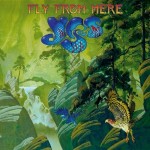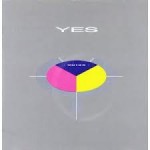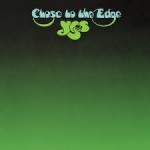 Yes are just about the last of the major-league 70s prog-rock bands still standing. While ELP still play the occasional festival headliner, and Roger Waters has recently been touring the Pink Floyd classic The Wall, Yes are just about the only one of the really big bands still putting out new material.
Yes are just about the last of the major-league 70s prog-rock bands still standing. While ELP still play the occasional festival headliner, and Roger Waters has recently been touring the Pink Floyd classic The Wall, Yes are just about the only one of the really big bands still putting out new material.
It’s probably best not to dwell on the politics behind some of the recent lineup changes. First we saw Jon Anderson replaced by Benoît David, recruited from a Yes tribute band. The, with Trevor Horn as producer, we saw Oliver Wakeman sacked in favour of Asia and Buggles keyboard player Geoff Downes, a member of Yes for 1980′s underrated “Drama” album. It’s better to judge them on the quaility of the actual music.
As might be expected with Trevor Horn in the producer’s chair, this album is closer to the streamlined, commercial Yes of the 1980s than than an attempt to recapture the sound of their 70s heyday, more “90125″ than “Fragile”. Benoît David acquits himself splendidly on vocals. Yes, he’s a soundalike, recruited for his ability to reproduce Anderson’s distinctive style live on the band’s extensive back catalogue. But those choirboy-on-acid lead vocals are an important part of what makes Yes sound like Yes, and he nails it perfectly. Steve Howe is also on great form on guitar, his style in it’s way just as distinctive. Despite his age he’s very much still got it.
The 25-minute title track, largely written by Horn and Downes, forms the heart of the album. Full of big soaring melodies, rich harmonies and repeated motifs it’s a prog epic with pop sensibilities, although Steve Howe’s spiralling Zappa-like “Bumpy Ride” section should keep diehard prog-heads happy. There’s definitely something of “Drama” about the whole piece, which given the writers shouldn’t really surprise anyone.
The rest of the album is a bit of a mix. High points are “Life on a Film Set”, another Horn/Downes number in a similar vein to the title track, and the anthemic full band composition “Into The Storm”, which closes the album. “The Man You Always Wanted to Be” comes over rather pedestrian to start with but picks up in the second half. But the weakest numbers, “Hour of Need”, and Howe’s pleasant but unremarkable instrumental “Solitaire” do come over as little more than filler. Which is perhaps the album’s weakness – an album with running time of an LP-length 48 minutes shouldn’t need padding out with substandard material.
So no, this album doesn’t reach the heights of their classic 70 and 80s albums. Neither does it quite match have the creativity and energy of the best of the current generation of progressive rock bands. But despite it’s flaws it’s still a strong album, far superior to the last couple of very forgettable albums they did with Jon Anderson. Time will tell if they have the courage to feature the album as heavily in the live set in their next tour as they really should, but this album is evidence that Yes are far from a spent force.



A well argued review and I agree with much of it. However, as an avid Yes fan I have to say that I have been really delighted with this album and would put it ahead of everything since, and possibly including, 90125. Also if there has been some genuine progressive rock better than this in recent times, please point me in the right direction.
The odd couple of typos aside, a fair review of the album. I’ve listened to it frequently since I got my review copy a week before release and my abiding impression is one of mellowness. It comes with age and has added something new to the Yes mix. Benoit does a good job of imitating Jon, but he lacks the inventiveness of the original. Consequently, the melodies can be a little flat and chant-like on occasion. Overall, a good album though and for a progressive rock fan like me, it is a welcome relief from the metallic thunder that passes for prog these days.
I think your review is spot on; the disc is very “Drama-like” and an enjoyable listen, but I’d say that’s all. Nothing new or particularly outstanding here, just a solid performance. Perhaps that’s all we can hope for from this aging soap opera-plagued juggernaut. Disclaimer: I listened to Fragile, CttE, and TfTO relentlessly in my teens/early 20s and had the pleasure to see the band perform these works on numerous tours in the US. Nothing since has impressed me as much as the music from that time.
I think there’s quite a bit of hyperbole caused by the fact that, even though it’s nowhere near as good as their best work, it’s still orders of magnitude better than anybody really expected it to be.
Would somebody please list who is among this “current generation of progressive rock bands”. Do they have any sense of melody? Today’s pop music would only satisfy those who desire nothing more than the sensation of pressure on their ears and I’m afraid that’s all I’ll find with the new “prog rock”. This will offend some but I have to say it: What rubbish today’s pop music is! The 4th of July concerts featured Beyonce in NYC and a marching band in Washington. Beyonce’s so-called songs were bland nothingness–no matter how excited her fans were. I turned the TV channel back to the music of John Philip Sousa–if the new stuff is crap, go back to the classics. Though pop culture addicts (such as Rolling Stone readers) will still pay attention to pop trendz, real musicians left the pop scene a long time ago and moved on to jazz (or at least tried to) and even as far back as the standards. So what does this have to do with YES? YES stood out in the seventies–a time when a band was judged by its musical ability–and the bar for pop music was set much higher. YES still aspires to writing meaningful, memorable music. That’s why I’ll always listen to whatever they record. Dissing an album by YES because it isn’t CTTE or TFTO is inane. Besides, if a new recording did resemble CTTE or Fragile, then they’re accused of sounding “dated”. In any case, the music of YES still beats everything else out there. At the very least, it doesn’t insult my intelligence.
Marillion
Mostly Autumn
Panic Room
The Reasoning
Touchstone
Spock’s Beard
Transatlantic
The Flower Kings
…and many, many more.
And my love is a band a lot of folks would never label prog – they would see the banjo, mandolin and fiddle and label them bluegrass. More’s the pity, as they mix in part bluegrass, part Celtic, part Middle Eastern, part Jam, and the best damned songwriter active currently.
Railroad Earth.
Here’s a recording of them from a festival a few days ago in the deep words of Orgeon:
http://www.archive.org/details/RRE2011-07-23.MBHO.Flac16
In particular, Warhead Boogie > Genesis, and Spring-Heeled Jack.
Oh, and Genesis is a Jorma Koukanen song (formerly Jefferson Airplane, currently Hot Tuna). An amazing song.
Dear Scott, Thank you for your recommendations of the “new” “prog-rock”. As soon as I read your post I headed to youtube to play selections from each of the bands you listed. I’m sorry to say that I was quite disappointed. Apparently what passes for “prog-rock” today would have been panned as utterly “crude and elemental” (to borrow some words from Walter Becker) thirty years ago. I heard no leitmotif in any of the selections I chose, and not even any sonata form. There is an ocean of difference between Yes’s “Siberian Khutru” and what I heard from Marillion. Mostly Autumn aimed for some atmospherics, but I’m interested in what is on staff paper. I’m interested in music. If what you listed is prog-rock today then the bar for rock must be set so incredibly low so that all one has to do to be a rock star is to have his great aunt by him an electric guitar and amp (if he maintains at least a C- average in school), purchase the Mel Bay method for guitar book volume 1 and cover only the first 20 pages. I’ll take a break from classical and jazz to listen to Yes, but certainly not to listen to anything you listed above. By the way, yes, “Genesis” is a great song by Jorma–with its memorable chord changes–in fact, the album “Quah” where the song can be found, is a example of a bunch of well-written songs. I haven’t even heard a good chord change in a long time. Speaking of Jorma, I caught Jorma about 20 years ago at the guitar summit concert where he headlines with Steve Morse, Kenny Burrell, and Manuel Barrueco. When he came out with his acoustic guitar, he sat down and played the riff from “Smoke on the Water”–again, I haven’t even heard a new, good riff in about 20 years–and everybody laughed WITH him. “I just like to do that” he said, before he launched into his set of Appalachian blues. Now, Deep Purple (“Smoke on the Water”) was by no means considered “prog” in their day. But their music is a helluva lot more advanced than the so-called prog today.
But still, thank you for your list. At the very least I want to know that I’m not missing anything.
Hi Arch,
Thank you for your comments. I had make the mistaken assumption that you were asking an honest question. But your combination of ridiculously elitist musical snobbery and pathetic childish insults makes you a superb example of the sort of person who gives progressive rock fans such a bad name in some circles.
Well, we’ll just have to agree to disagree. You obviously have your own agenda.
I shouldn’t respond to trolling, I know, but with great respect to Mr Stanton, he really doesn’t know what he’s talking about. If he’d read any books about Yes, he would find their writing process to be very haphazard. The results were often great (and sometimes superb), but they were a group of rock musicians who put songs together by combining lots of different ideas, not a group of master-composers taking a classical approach to composition. Many musicians in many of the current prog bands are at least as musically knowledgeable and technically proficient as musicians from the 70′s. And if he hasn’t heard a good chord change in a long time, maybe he’s just tired of music.
Just want to say that this is a far better review then the superficial Guardian one I just read. Just because I like a particular group I don’t expect a fawning piece of writing, just something critical yet fair and balanced, which is exactly what you did. But it seems the Guardian review (brief as it is) is a bit out of step because quite a few other reviewers are largely positive.
Greg – Should have guessed “Mr Stanton” (probably not his real name) was just trolling from the beginning.
Chris – That Guardian review is awful. Another music critics (who writes for Classic Rock Presents Prog) suggested on Twitter that The Guardian’s reviewer should really give up trying to write prog-rock reviews if he’s going to keep making a fool of himself that way.
Or – Guardian reviewer gives up trying to write prog-rock reviews and the Guardian lets you do it,then they would be employing someone who knows what he is talking about,an idle dream maybe but a good one.
Sorry, Tim, but I don’t follow you. I was merely trying to talk about music. This is a music review blog, is it not? And if making comparisons is snobbery, what is this(?):
“Bit harsh there, Dave. Doesn’t match the standards of their classic 70s material, or the output of many younger, more energetic prog bands. But it’s far, far better than the last couple of very forgettable albums they did with Jon Anderson.”
“Far Better”? “Doesn’t match the standards”?
BTW, I WAS making an honest question and I followed up on the answer and listened to what Scott offered. Thank you, Scott. Nevertheless, I still stand by my own observation: what passes for “prog-rock” today would not have 30 years ago. The prog-rock of yesteryear was FAR BETTER than what is recorded today or, if you will, the “prog-rock” of today “DOESN’T MATCH THE STANDARDS” of that recorded 30 years ago.
If YES music can be compared within its own repertoire, why can’t other comparisons be made?
AND
“The rest of the album is a bit of a mix. High points are “Life on a Film Setâ€, another Horn/Downes number in a similar vein to the title track, and the anthemic full band composition “Into The Stormâ€, which closes the album. “The Man You Always Wanted to Be†comes over rather pedestrian to start with but picks up in the second half. But the weakest numbers, “Hour of Needâ€, and Howe’s pleasant but unremarkable instrumental “Solitaire†do come over as little more than filler. Which is perhaps the album’s weakness – an album with running time of an LP-length 48 minutes shouldn’t need padding out with substandard material.”
“rather pedestrian”, “little more than filler”, “the album’s weakness” “padding out”
Those are all comparisons, Dude. Where do you get off calling somebody else a musical snob?
Well in my opinion everybody has missed the key question which is much more fundamental than the use of the Sonata form or the absence of leitmotif. Why does the accordion get used so little in prog rock? It is particularly effective for those easy-to-dance-to waltzes.
Heh,
A few weeks ago I saw a local band (La Mort Subite) playing a mix of jazz and east European folk, and I observed that they were using the accordion in exactly the same way as some classic prog bands used the Mellotron.